|

|
|
Click the button above to hear Larry
Adler's "Theme From Genevieve" in a version with full orchestra
Click the button above to hear Larry
Adler's "Theme From Genevieve" in a piano and harmonica version
Click the button above to hear
Percy Faith's "Genevieve" - the "love theme ballad," with vocal!
Larry Adler on Scoring "Genevieve"
|
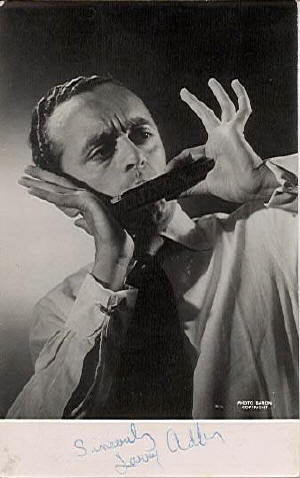 |
Excerpted from
"Me and My Big Mouth" by Larry Adler
Whoever
in their right mind would have thought that a film about a classic car with a
girl's name could become a classic movie in its own right? Certainly not the
Rank Organisation, who rode to fortune on her running board. Or even the stars
themselves, who had no idea they were at the wheel of the surprise hit of the
year.
I'm talking about Genevieve, of
course. Dare I say it -- yes, indeed I dare! -- it was vintage stuff. A breezy,
happy-go-lucky story centered around a veteran car rally from London to Brighton
with all the predictable pitfalls -- if not pit stops -- that beset the quartet
on board. And what a cheery bunch they were: Kenneth Moore, John Gregson, Dinah
Sheridan and the gorgeous Kay Kendall, the bubbly brunette who became known as
the "strumpet voluntary" after her high-spirited rendering on a bugle
during one of the film's high spots. |
| |
|
|
| Me, I wrote and played the catchy
theme... and won an Oscar nomination for it, though my name never got on the
programme on awards night. Ah, Genevieve! That magnificent
lady came thundering into my life on an otherwise unremarkable evening in 1953.
I was idling away at the piano at a party in someone's house in Mayfair, making
up the melody as I went along.
A lady named Vivienne Knight, who
worked in public relations for J. Arthur Rank and would later become Mrs.
Patrick Campbell, came over. "That's nice," she said. "What is
it?"
|
| |
|
|
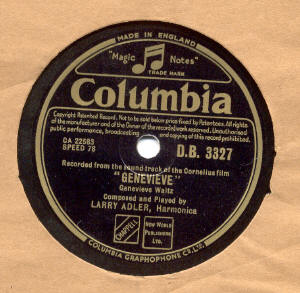 |
People were always saying that to me.
"Oh, I'm just improvising," I told her. Usual question, usual reply. Next day the phone rang. On the line
was Henry Cornelius, a producer who told me he was in the process of putting
together a comedy about the annual London to Brighton car run. He had heard from
Vivienne that I might be the man to write to score.
"Well --" I was doubtful.
Scoring a film was a highly technical skill. Cornelius insisted that we meet and
suggested Les Ambassadeurs.
|
|
| |
|
|
| OK, there's no such thing as a free
lunch -- even for me. But Les A. was a tempting carrot. Who was I to resistant
offer like that? Over the steak poivre if he put the proposition to me:
could I handle it? |
| |
|
|
| I said no, I couldn't. "Vivienne says you can do it, and
that's all I need to know," growled Henry, in a tone that brooked no
argument. "At least take a look at the script."
When
I read the screenplay, I felt a sudden surge of excitement. You get those
feeling sometimes, don't ask me why or how. But it happens. And when I saw the
rough cut at a private screening room in Pinewood studios -- I was hooked. Line
and sinker!
|
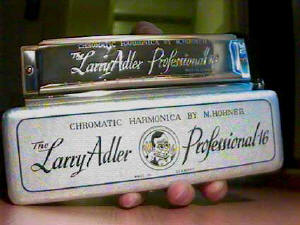 |
| |
|
| The script was charming and witty. The
characters likewise. The atmosphere was bubbling with lighthearted, essentially
British fun where everything that could go wrote did go wrong,
particularly when it came near the bedroom. It became one of the biggest British
screen hits of all time. More than that, anyone who saw it would
forever afterwards associate the name Genevieve with that film. And how
often can you say that of the movie or a name?
Am I right, or am I right?
Oddly enough, one line in the script
decided me. Early in the film, Dinah Sheridan is in the kitchen of her mews
house. She calls up to her husband (John Gregson).
"Alan... proper lunch or proper
dinner?"
That line decided me. It was so quaint.
I had to do Genevieve.
|
| |
|
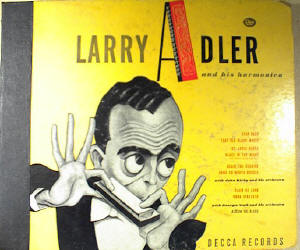 |
It was a small-time movie, not expected
to make any waves. The lead players were virtual unknowns, so you couldn't call
them stars. Later would be another story. The entire film cost 100,000 pounds,
which is probably marginally less than you pay the guy who massages Stallone or
Schwarzenegger into life in today's overkill movie budgets. My agent called me, and sounded gloomy.
He had asked for 750 pounds. Cornelius pointed out that he didn't have 750
pounds. My price dropped to 500 pounds. Sorry, no. Henry couldn't raise that,
either. Suddenly he didn't seem to have any money at all. Figuratively speaking,
I was blowing in the wind.
|
| |
|
| "Forget it, Larry. This is a small
time outfit. Let it go, and we'll find another picture for you later in the
year."
He
was right, of course. But one thing was nagging me. "Nobody has ever ask me
to compose before." I thought of something else. "Besides, I love the
film and I want to do it."
They offered me a percentage: 2 1/2
percent of the producer's share. It doesn't sound like much, and it wasn't. But
as the film took off I became richer than the actors, who each got a flat fee of
1500 pounds -- yes, that's all -- with no participation in the proceeds.
It's an old story, but it's still sad
when it happens. John, Kenny, Kay and Dinah -- if only they had been given a
slice of the cake. When that movie opened to rave reviews ("one of the best
things to have happened to British films over the past five years" -- Gavin
Lambert; "Who he -- Ed?") it was making a profit within the first
month. As for me, I happily put my children through college on the proceeds.
But behind the scenes, trouble loomed.
Not for the cast or crew, but for me. America was nervous. Meaning Hollywood and
New York, where the power play was centered. What was the problem? In two words
-- Larry Adler.
|
| |
|
| The word got out that I was writing the
score for Genevieve. Henry Cornelius was one of the good guys, an amiable soul
celebrating his 40th birthday as he ushered Genevieve safely through the winning
tape on Brighton sea front on that June afternoon. As a would-be actor he had
studied under Max Reinhardt, but he had really marked his card in the public
perception as someone rather special with his 1949 comedy Passport to Pimlico,
two years before Genevieve took to the road. |
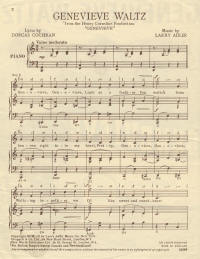 |
| |
|
| Henry called me into his office. He
looked nervous and upset as he gestured to me to a chair. It seemed that a call
had come through from a top executive at the Rank Organisation. The message was
terse and to the point: get Larry Adler off the picture. |
| |
|
|
"They've been told that if your
name is on the film, it won't get an American release," he said, with a
hopeless shrug. The shadow of the blacklist had reached
across the Atlantic. I looked at him. "Corny," I said. "You are
the one who put me on the film. If you want to take me off, just say so. I'll
go. I don't want to do anything to hurt you, or the film. Do you want me off
it?"
He shook his head. "No. I love the
stuff you've turned in. I don't want to lose it."
"OK," I said. "Let my
agent battle it out with Rank. I'll keep working on the score."
|
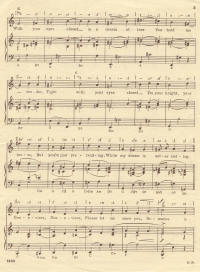 |
| |
|
| Cornelius agreed. Later he would
describe my methods as "chaotic" -- but they worked. I would get a
sudden inspiration, and write notes down on scraps of paper which I stuffed into
my pockets, or pasted into a manuscript book. When I got to the studio I emptied
my pockets onto a table, and went through the score with the musical director,
Muir Mathieson. Mathieson was the Scots-born veteran of
literally hundreds of British film scores, either as composer or conductor, all
the way back to the 1930s. His credits read like a musical role of honour, from The
Scarlet Pimpernel (1935) with Leslie Howard, Laurence Olivier's masterpiece Henry
V (1944) and Brief Encounter (1945) with Trevor Howard and Cecilia
Johnson to The Seventh Veil (1945) with James Mason and, later, Lord
Jim (1965) which starred Peter O'Toole in the Joseph Conrad epic of far
eastern skullduggery.
|
| |
|
| Here was Mr. Mathieson, floundering
through the notes of what Henry Cornelius dubbed my "route map," and
looking as lost as if he'd plundered into Hampton Court maze. Corny told one interviewer: "Even
Larry didn't know how the pieces of paper followed each other. He works by
memory, with some crazy method of his own. There was only one thing to do -- we
put our heads down for eight terrible hours trying to get the music into some
sort of order, and finally got the route map together.
|
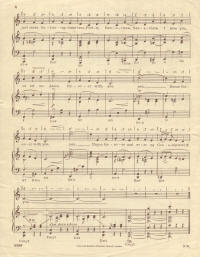 |
| |
|
| "It worked like this: you play the
first four bars on page 5, then the last 23 bars on page 1. Repeat the four bars
on page 5, then play the little 'bridge' which is on a separate piece of paper.
You finish this sequence with 10 bars, ringed in red ink, on page 13!" The final score, in the words of critic
Herbert Kretzmer (who would later write the script of Les Miserables),
turned out to be "one of the freshest and most enchanting soundtracks ever
heard on a British film."
I guess that exonerated me.
What it didn't do was spare me from the
wrath of the zealots in Hollywood who were still under the McCarthy yoke, and
thirsting for blood.
Behind the scenes, the in-fighting
began. I had no written contract, just a verbal agreement. That was always good
enough for me, as long as I knew the parties involved. In this case, it left me
with no cards to play. I had to make a compromise if I wanted to stay on the
film -- leave the billing to the Rank Organisation.
My agent was firm. Do it, Larry. You've
really got no choice. So, OK, I did it. But not without qualms. I had never had
this kind of pressure before, and I didn't like it one little bit.
United Artists distributed Genevieve in
the U.S.* She was booked for a New York opening run at the Sutton Cinema on East
57th Street to see if she would take off across the country.
Six weeks before the opening date, the
Rank Organisation received the word that the U.S. distributors wanted my name
taken off the print. Oh-oh!
They got it. Genevieve opened in
New York to excellent reviews, with the name Larry Adler conspicuous by its
absence from the credits. Suddenly I was Public Leper No. 1. I have to say that
few things have hurt me more than having my name taken off the billing -- though
I got some satisfaction when most of the critics gave me credit for the music.
Out of the blue, that February, came a
note from Ira Gershwin. "Didn't you tell me that you had composed the score
for Genevieve? The music has been nominated for an Oscar -- but composer
is named as Muir Mathieson."
And so it was. The ballad had been
recorded by Percy Faith for Columbia, my own soundtrack was out on the same
label, the music was published in Britain by "Larry Adler Music." No
good. I was o-u-t -- and I was one angry man. But what could I do?
Once the nominations were in to the
Motion Picture Academy, they couldn't be changed. Rank had touched the forelock
to the czars of Hollywood. I was the fall guy. On Oscar night my name was never
even mentioned in despatches. But in the end it was that wonderful Russian
composer Dimitri Tiomkin, of High Noon fame, who collected the treasured
gold plated gnome for The High and the Mighty.
Muir Mathieson was a gentle Scotsman, a
peer among his own kind. I couldn't figure out how he had the effrontery to
accept the Academy nomination for composing the score when both he and I knew it
was my work, my blood, sweat and tears that had created it. Christ, we had been
standing together on the sound stage at Shepperton and as he conducted the
orchestra!
Some weeks later, I met him as a
charity function and faced him with it, point-blank. "How could you?"
I demanded, man to man.
"But Larry," protested the
grand old Scot. "I just thought the Academy was giving me a special award
for services to British film music."
I believed him.
The odd thing about that film is that
no one saw it coming. In Germany, it laid a large egg. Rank hated it -- yes,
hated it. Initially they put it on the shelf, and for a time it looked as if Genevieve
wasn't going to take to the open road of a nationwide release at all.
As for me, I had gone through all sorts
of agonies after seeing the completed film and a private cinema in Soho, the
first movie I had ever scored. Why, people were actually talking over my
beautiful music, drowning it with dialogue and sound effects! The lesson I
learned was that the only time the film composer ever hears his score the way he
wrote it is when it is being recorded on the sound stage.
While we were still in limbo, another
picture opened for six-week run at the Odeon, Leicester Square, the flagship
cinema for the Rank Organisation. It was a flop and it had to be taken off. The
only film around was Genevieve.
The rest -- well you know it.
* Actually, Genevieve was distributed
in the U.S. by Universal.
|

Offsite Larry Adler Links

[ Up ] [ Genevieve Rally July 2002 ] [ Models and More ] [ Bookshelf ] [ Genevieve Links ] [ Is This the Real Mr. McKim? ] [ What's Wrong Here? ] [ The 'Very Easy' Genevieve 50 Years On Quiz ] [ Genevieve Picture Gallery ] [ Music by Larry Adler ] [ Genevieve's History ] [ The Cast ] [ Filming Locations ] [ Making "Genevieve" ] [ London to Brighton 2000 ] [ Audio Clips ] [ Site Map ] [ Thanks ] [ Down Under ] |

|
|
